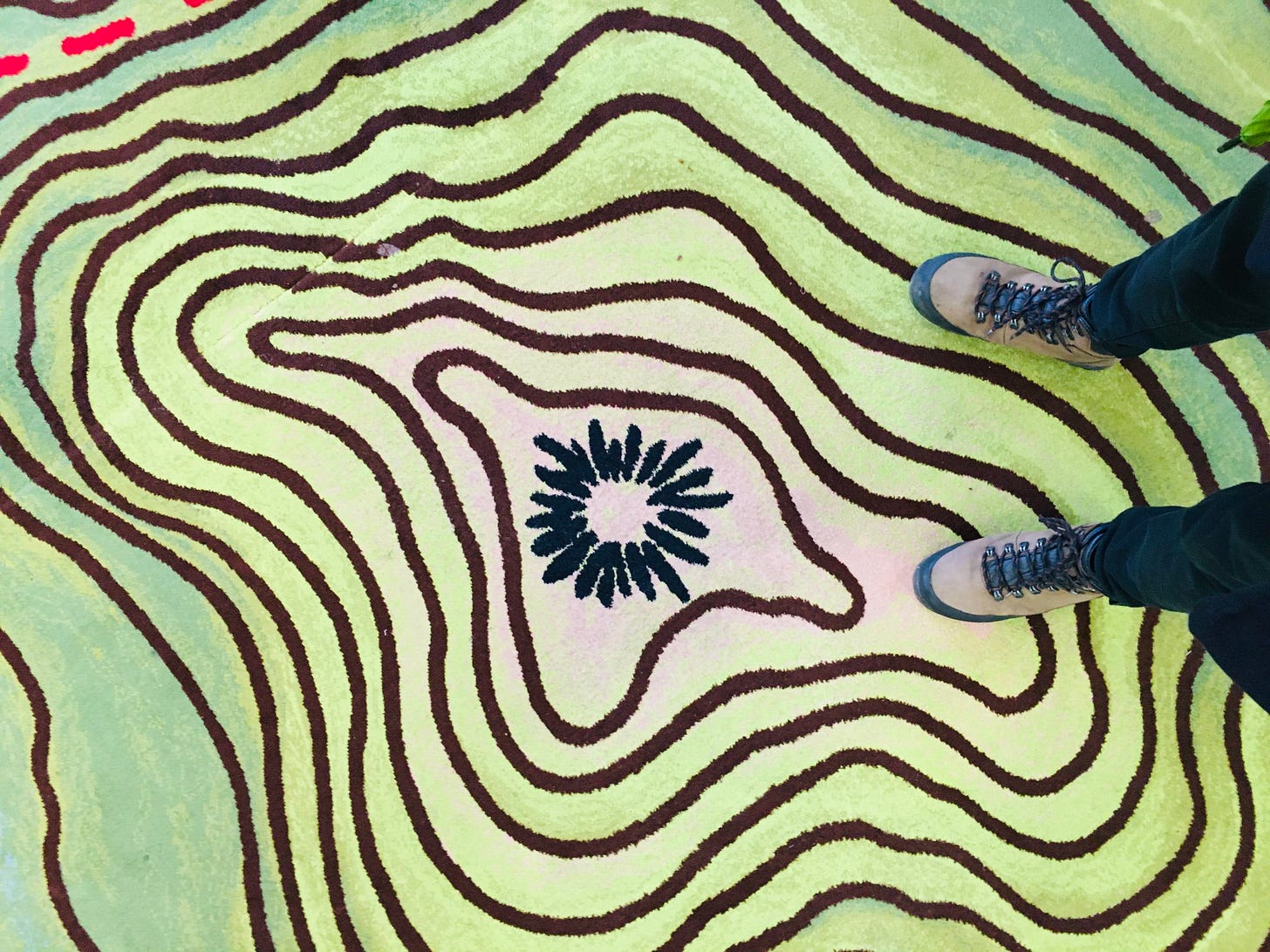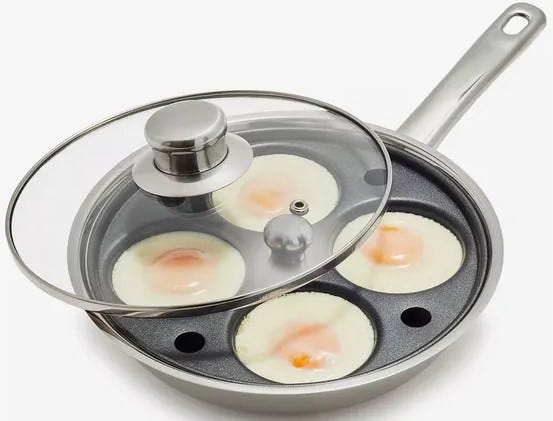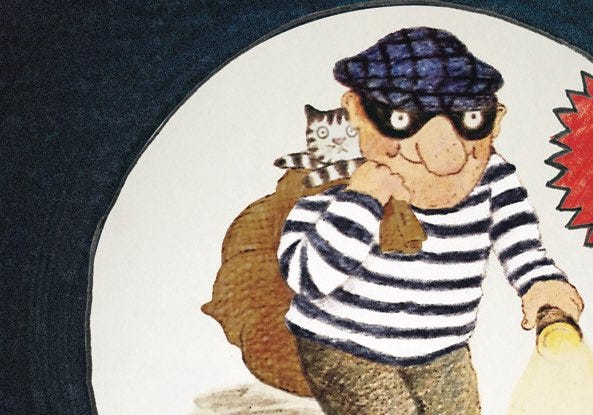Happy Monday, one and all. Welcome to New Escapologist, the free and easy newsletter from the magazine of the same name.
Speaking of the magazine, would you like to order the next edition? It’s the December issue but we’re way ahead of schedule, so we’ll ship early (mid-Nov, probably) to those who order first. That, quite possibly, means you.
Issue 17: All the Way Home is £10 plus shipping. A real 88-page magazine will fly squarely into your hands from Internetland. You don’t get much for a tenner these days and our magazines contains multitudes, so what are you waiting for? Go, go, go!
The digital edition can also be pre-ordered for an even more laughable £8, but obviously the automatic download won’t work yet. Order today and you’ll receive your epub and PDF files by email on the same day the print edition ships.
Surprisingly (because the magazine usually sells out by now) there is still a handful of Issue 16 in our stock cupboards. Please relieve me of this humiliating burden.
Mr. Young Enterprise 2004,
Robert Wringham
www.newescapologist.co.uk
Experience
I don’t know who this guy is* or where I found the quote, but it was staring up at me from my notebook this afternoon.
(*actually I know something of him now thanks to some helpful readers).
Joseph Campbell, The Power of Myth:
People say that what we are all seeking is a meaning for life. I don-t think this is what we’re really seeking. I think what we’re seeking is an experience of being alive.
I think that’s very true.
“The experience of being alive” — or rather the confirmation of it — is the opposite of what we get when sweating at a desk in front of a monitor screen for some guy we’ve never met or barely know.
It’s the opposite of that braindead feeling that comes from commuting, making smalltalk with people we don’t particularly care for, watching television, eating junk.
It’s that sparky feeling we get instead when we do something worthwhile, something with a sense of connection, something that genuinely translates to value or positivity in the world.
So it might not be ‘meaning’ we’re looking for in life (which, we all know, is nonsense when you put it into a computer) but experience. I think that’s great. Direct, soul-pleasing, non-intellectualised experience.
Something that tells you “you’re here, right here, right now.”
On Redundant and Neglected Objects
Comedian Richard Herring (who we interviewed way back in Issue 10) is moving house. Packing up his kitchen stuff, he writes in his blog that
it’s weird to touch every single thing that you have in your kitchen in one weekend. And realise that for many things it’s the first time you’ve touched them since you’ve bought them.
As a regular reader of his blog, I know that Rich prides himself on a certain material efficiency. He’s keen on recycling, for example, and on getting every last drop of utility out of single-use carrier bags. And yet…
I rarely if ever have poached eggs at home, but for some reason had at least five devices designed to give you the perfect poached egg that I HAVE NEVER TRIED OUT! Well I did have. Now they’re in a box to go to charity for someone else to buy, put in a drawer and NEVER USE.
Those egg poachers will probably survive way longer than anyone who is alive today and yet never fulfil their purpose of poaching an egg. I don’t know whether to feel sad for them or happy. Is that a life well lived or a waste of existence[?]
I firmly believe it’s a waste of existence. Imagine being one of life’s understudies and never getting to step into the spotlight.
It’s something that bothers me, actually. If I have anything redundant in my home (let alone five of them), I feel sad about it. I want everything in my home to be used. No one thing should be neglected.
Part of my feeling this way comes from my theory that waste happens at the point of origin, not at the moment of disposal. The waste occurs when the raw materials are torn irreplaceably from the earth. If we never mined or extracted oil again and had a completely circular economy, there would be no more waste. Every egg poacher in the world would be either used or stripped for its materials to make something that can be used.
Too much emphasis in eco-guidance falls into the categories of reuse and recycling: not enough people call for reduction. Reuse and recycling theoretically delay more waste from happening, but only a reduction in objects being produced will really solve our problems. And if we want to reduce the number of objects in the world, the first objects to be eliminated should be the redundant ones.
or should I stop giving inanimate objects the power of thought and emotion[?]
It’s called Kami in Japan, the idea that everything has a soul, even inanimate objects. Even if that’s not “real,” it’s useful to keep in mind when deciding if something is living up to its potential or not. It’s perfectly possible for an object to “experience” neglect, exclusion or redundancy.
Oddly enough, the most redundant items in my home are also egg-related: two eggcups. They’re of a groovy mid-century design and taken from my grandparents’ kitchen along with some other bits and bobs when they died. I don’t eat boiled eggs very often so they don’t really get used enough. They’re on the chopping block of minimalism really, but I like them. So I’d better start eating boiled eggs.
Fletch
Thanks must go to the New Escapologist correspondent (okay, it was Henry) who sent me a letter, received this morning with this stamp on the envelope. Truly first class.
What Do We Want? More Time for Golf! When Do We Want it? After My 12:30 With Steve!
This is from Maclean’s:
The big question is: what will we do with all that extra time? Some will use it on family-oriented activities, like caring for elderly relatives or spending more quality time with their kids (not to mention saving on childcare costs). Others might return to a lapsed hobby or develop a skill they never thought they’d get a chance to learn. For example, foreseeing a huge increase in leisure time, Steven Cohen, an American venture capitalist and the owner of the New York Mets, has reportedly invested heavily in golf. The ultimate goal is working to live—not the other way around.
The reduction of working hours is a classic demand of labour movements, so it’s good (as with UBI sometimes) to see the four-day week being discussed favourably by the conservative press. It shows that the Overton window is shifting in favour of less work and more leisure.
Stop, Thief!
A random thought about ownership in relation to minimalism.
Once, when I was working a short-term contract, I found a funny coconut monkey (you know the sort of thing) in a dusty storage box. It looked like the souvenir of a Wage Slave’s holiday, brought back from Hawaii for ambivalent co-workers.
The monkey was so grotesque that I almost took it home, but then I realised that this would in fact be stealing so I left it in the box.
Most people wouldn’t even have thought of taking it, would they?
A similar thing happened a decade earlier. Just before leaving for a long spell in Canada, I found a coffee mug in the back of a girlfriend’s kitchen cupboard. It said on it: “you can take the girl out of Glasgow, but you can’t take the Glasgow out of the girl.” Well, this would be the perfect talisman to take to Montreal! “Could I have this?” I asked. “No,” she said, bewildered that I’d just ask to take something from her house.
I think this weird (occasional!) willingness to just take something that isn’t mine comes from years of minimalism because:
1. I’ve honed a pseudo-spiritual belief that ownership is a relatively empty concept. It’s rarely more than a case of displacement: a thing is “here” instead of “there.” Big deal.
2. The idea of things not being “in circulation” frustrates me. I don’t want anything to be neglected or out of service. It would be better to have X valued objects in the world, all moving around and everyone having a turn with them, than 1000X objects in the world, all locked away in boxes.
My literally criminal urge to “take” is probably the flipside of the more widely documented minimalist urge to give things away. When I’m done with something, I return it to the world by taking it to a charity shop, by listing it on eBay, or by leaving it on the street with a “please take” sign.
Or maybe I’m just a secret klepto.
You never really own anything. Either it breaks and becomes garbage, which you then surrender, or you die and someone else inherits it or throws it away.
Papa? Non. C’est Nicole
The idea of a grown-ass adult having to request time off is hilariously sad to me.
Reader M draws our attention to a YouTuber called Nicole. M writes:
I’ve been enjoying her no-BS style. She dispenses tips and wisdom on personal finance, frugal living and all the rest. None of it is new, but she’s unusually young to have already worked out The Trap and is telling the world about it on YouTube.
M’s right. She’s fab.
City Slicker
From the blog of lifestyle guy George Hahn:
Between the space I occupy, the goods I consume, the energy I burn, and the trash I generate, I would argue that I create a comparatively small footprint for an American.
As everybody who knows me knows, I love city living. Aside from its unparalleled cultural offerings, amazing restaurant options and unyielding excitement, it’s incredibly efficient.
This is something I think about a fair bit. I watch all these Tiny Home videos (and I enjoy them!) but bristle slightly when they boast about their green credentials. How can building a house from scratch in the middle of nowhere be greener than living in an apartment building, close to everything you need, that already exists?
I love Tiny Homes and I see the economic attraction to them, especially if you’re coming from a city like, say, Melbourne where the cost of living is out of control. But buying land and putting a home on it — even a tiny one — is a contribution to sprawl. And, when all is said and done, building a new thing (any new thing) involves the extraction of raw materials from the earth. Many (but not all) of these Tiny Homes won’t last for decades or centuries like a real house. Not a problem for you if you don’t care about asset depreciation, but a disposable house is hardly the green option even if you invest in solar panels and keep your own chickens.
Around and around go my green bean-counting thoughts and I always come back to the conclusion that the greenest (as well as happiest, most cost effective, most socially-responsible) option is to live in a city. In a small apartment. As well as helping to continue the life of an old thing (with all its character and charm) instead of building new, you have all the efficiencies of high-density living. Everything you could possibly need is within walking distance so you won’t need a pollution-producing car. Recycling centres are abundant. Club goods like gyms and libraries mean you don’t need to own so much stuff. It’s green! It’s efficient! Really!
After nearly 30 years as a New Yorker, I think I’ve managed to crystalize the biggest bonus of city living into one word, which is basically a byproduct of the city’s efficiency: access.
He means access to culture, supplies, transit, other people. And I think he’s right. I could be wrong because I don’t live in the country and there might be factors I’m not seeing, but I think he’s right.
On the other hand, Hahn seems to like “big cities” best of all and, while acknowledging their expense, he advocates for London, NY, Tokyo.
Instead, I’d say it’s smarter to keep it simple and live in a cheaper city if you want to work less and have a better chance at escaping the consumer treadmill: Glasgow, Manchester, Liverpool, Montreal, Naples, Antwerp, [East] Berlin. Why not? Escapology happens more readily in the margins.
Where to live? Did I mention that the theme of the forthcoming Issue 17 is home?
The Suck-Suck Man
I’ve enjoyed Mr. Biffo’s comedy for years. Sometimes it takes the form of unhinged Tim and Eric-style sketches. Other times, it’s grounded in video game reviews and a teletext aesthetic. He’s funny!
Lately, he’s turned his attention to social issues, reporting on them with good humour but relatively straight. This video explains UBI in a very funny and accessible way.
Letters to the Editor: Probably Too Unsafe
To send a letter to the editor, simply write in. You’ll get a reply and we’ll anonymise any blogged version.
Last month’s item about sleeping coffins seems to have captured people’s imaginations.
Reader X emails:
I think the mobile coffin/tent idea is probably too unsafe, but I’ve long thought that cities need ‘nap hotels’ that you can rent with a card swipe.
Japan obviously has capsule hotels that sort of check the checkbox, but imagine being in a city for a weekend and just needing a capsule for the night, or even a quick nap between outings. I would use that!
I travel a ton and often pay extra for late check-out just so I can explore in the morning, come back to the hotel for a quick nap, and then leave.
I could see this being an option in other places too – national parks where people do multi day hikes? Have a hostel-type building where people can shower and chill but also have individual sleeping pods?
Reader Tom comments:
Genius! I can see Sleeping Coffins inc. needing zero marketing for the goth crowd. For the rest of the public…
While doing some research on bivy sacks, I found this gem of a tip from a manufacturer of such equipment: “Cinch the bivy’s hood down around your face, but avoid breathing inside the bivy which can create condensation.”
Not sure if they mean don’t breathe at all? Definitely a body bag in that case!
Reader Russell comments:
When I visited the Greek island of Hydra (a wonderful town devoid of cars and full of cats) I almost slept under a tree near a monastery to avoid hotel fees.
In the end it rained, and I had an (unwarranted) feeling that I would be scolded by someone for slumming it, so I scampered back to civilization. Next time I’ll arm myself with a bivy sack and more courage!
Hi everyone.
Russell, you should listen to the episode of Uncanny where two Belfast boys sleep rough beneath a bridge only to be farted on by a French goat encounter the devil himself.
Tom, soon, being dead will be the only way to rest in a city for a decent price so maybe we should just get this business started up!
Reader X, I like the idea of a nap hotel. Hostels can facilitate that, I suppose, though sometimes you can’t check in until 3pm, which sorely limits the napportunities.
Incidentally, I stayed in a capsule pod in London recently. It’s in a hostel I’ve started using on trips to the capital. To rent a dorm bunk at this hostel costs about £23, which is incredible by London standards, but they also offer a pod for about £50. I decided to try a pod this time, but there’s really no advantage over a curtained bunk. You have control of your own ambient lighting but I’m not really sure there’s any point to that when (and this is the way I sleep but others may have a different approach) your eyes are closed.
That’s quite enough newslettering. If you can stomach any more from me, please buy Issue 16 and/or pre-order Issue 17 today. Thank you. I appreciate that other magazines and newsletters are available.
Much love,
Robert Wringham
www.newescapologist.co.uk








